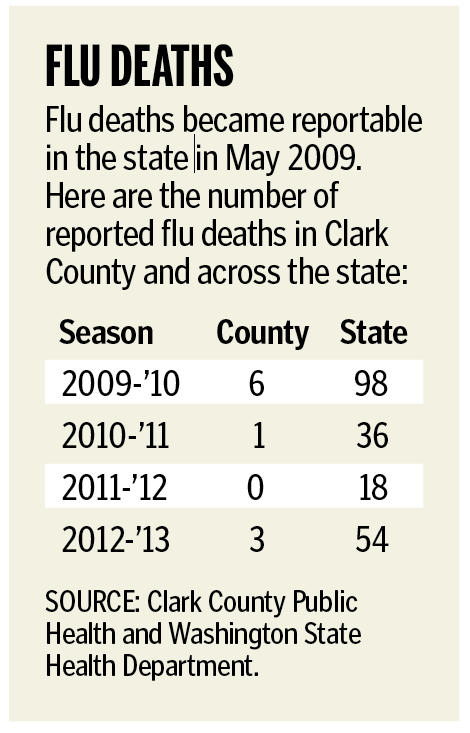For the second time in as many years, the flu has proven deadly in Clark County.
On Monday, a Vancouver man in his 80s died from influenza. The man, who also had underlying medical conditions, died after contracting the H1N1 strain, said Don Strick, spokesman for Clark County Public Health.
From the beginning of December through Jan. 8, the state has recorded 11 laboratory-confirmed flu deaths.
“The total isn’t atypical and falls in line with previous flu seasons, as we’re just now starting to reach the peak of flu season,” said Marqise Allen, spokesman for the Washington State Department of Health.
Last flu season, 54 people died from the virus, including three in Clark County.
During the 2009-10 season, during the H1N1 or “swine flu” pandemic, 98 Washington residents died from the flu, according to state health department data.
The year before, nobody in Clark County died from the virus, and only 18 statewide.
This year, eight of the 11 people who have died from the flu (which doesn’t include the recent Clark County death) were over the age of 50. Two men who died were in their 40s and one Snohomish woman was in her 30s.
Health officials know the current total, however, is just the tip of the iceberg.
The totals are really just a low estimate of the actual total for two reasons, Allen said. First, there’s often a delay between when a sample is sent to the state lab in Shoreline and when it is verified as the flu virus. The other reason is because doctors will often make a clinical diagnosis and not send in a sample, Allen said.
To prevent the flu, health officials recommend everyone 6 months and older get a flu shot.
“There’s still plenty of time to get a flu shot, and this year’s vaccine will help against the H1N1 strain, which is the most common strain floating around this year,” Allen said.
The vaccine, however, takes two weeks to build up enough antibodies to protect against the flu.




